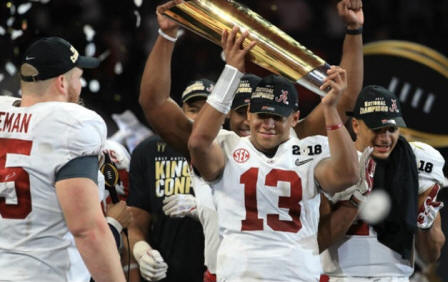
The Great Smoky Mountain Journal
Staff, Wire Reports
Posted: Tuesday, January 01, 2019 02:20 PM
OPED: Alabama's Big Game, Tagovailoa's Big Faith On Display Monday Night
Alabama’s stunning come-from-behind
NCAA championship victory over Georgia was fueled by freshman
quarterback Tua Tagovailoa. In a remarkably humble interview after the
game, especially given what he’d just accomplished on national
television, he said: “I would like to thank my Lord and Savior Jesus
Christ. With him all things are possible.”
Now two years ago, on BreakPoint, I talked about Tagovailoa’s faith—back
when he was still in high school. Here’s a part of that broadcast from
2015:
Sports Illustrated recently told the story of Tua Tagovailoa, who is
considered to be the best high school football player in Hawaii. The
junior quarterback at Honolulu’s Saint Louis High School is drawing
comparisons to the school’s most famous alum, Heisman Trophy winner
Marcus Mariota.
On the surface the comparison is understandable. Besides playing for the
same high school, both quarterbacks share a similar style that makes
them a threat on the ground and in the air. And like so many great
players in Hawaii, they share a Samoan heritage.
And it’s this last bit that’s the most intriguing and inspiring part of
the story, at least for Christians.
At the heart of the Sports Illustrated story about Tua is his
relationship with his late grandfather. It’s a story about a Christian
from one generation passing a spiritual legacy to the next generation.
The article is filled with Bible verses. It tells readers that the
entire Tagovailoa clan gathers “every evening for prayer and teaching,”
and to sing a Samoan hymn that “asks God to be present in everything
they do.”
This is something that Tua has in common with his hero, Marcus Mariota.
Mariota, as we’ve said before on BreakPoint, is also a Christian whose
goal is “to go out and show the world that Christ lives.”
Football fans have long noted the disproportionate number of Samoan
players in the NFL and in big-time college football. By one estimate, “a
Samoan male is 56 times more likely to play in the NFL than an American
non-Samoan.” Football greats like the late Junior Seau and Troy Polamalu
are only two members of this illustrious line.
Less known, and even more important, is the role that Christianity has
played in the lives of so many of these players and in Samoan society as
a whole. Stories like that of Tagovailoa, Mariota, Polamalu, and former
Raiders quarterback Marques Tuiasosopo are a testimony to the
extraordinary success that 19th and 20th century missionaries had in
converting the Samoan people to Christianity.
When the first missionaries from the London Missionary Society arrived
in 1830, they found that there were already some Christians on Samoa. In
keeping with Polynesian culture, it arrived via longboat, probably from
places like Tonga and Tahiti, where Wesleyan missionaries had already
been at work.
Western missionaries then built on the Samoans’ attraction to
Christianity. By 1855 the entire Bible had been translated into Samoan.
And before long, native Samoan religion had been replaced by
Christianity.
Today, virtually every Samoan self-identifies as a Christian of some
sort. More than 60 percent describe themselves as “very religious.”
Prominent Samoans frequently refer to Samoa as a “Christian nation.” The
preamble to Samoa’s constitution describes Samoa as “an independent
State based on Christian principles and Samoan custom and traditions.”
What’s more, 91 percent of all Samoans agree with the statement that
Samoa is “one of the most religious nations on Earth.” Thus,
Christianity’s influence on Samoan life and culture is hard to dispute.
This legacy and heritage are on display in stories like that of
Tagovailoa’s. The missionaries who brought Christianity to the
Polynesian world wound up transforming an entire society.
Now, I’ve got no idea whether Tua Tagovailoa is the next Marcus Mariota
on the field. But what matters is that he seems to be following an even
more important Samoan tradition off of it. And that is worth
celebrating.

